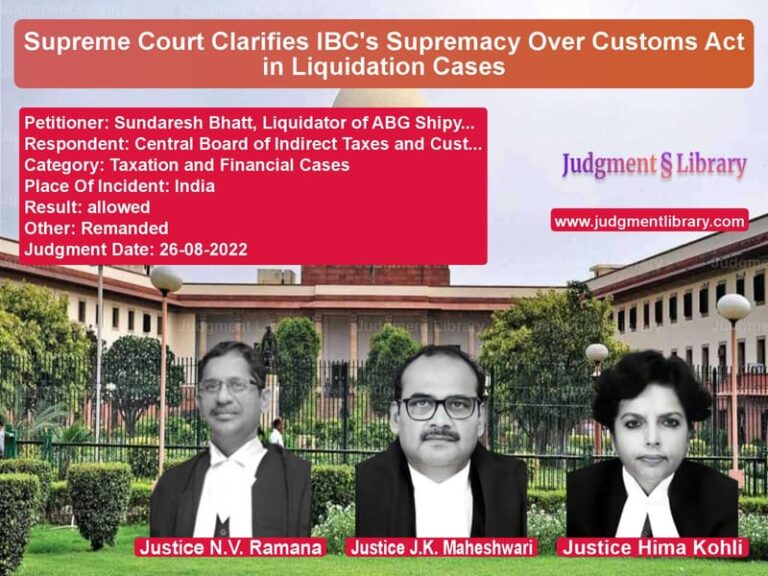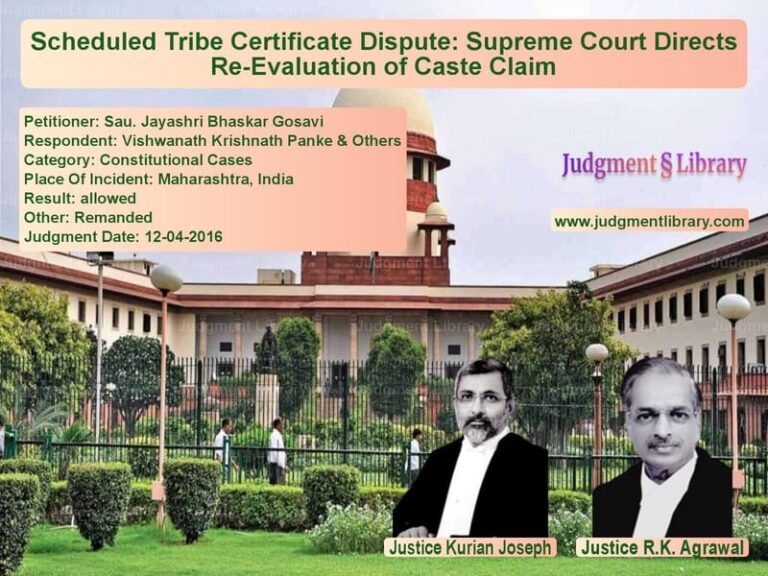Legal Analysis of Money Laundering Bail Rejections
The case of Tarsem Lal vs. Directorate of Enforcement presents a significant legal challenge concerning anticipatory bail in money laundering offenses under the Prevention of Money Laundering Act, 2002 (PMLA). The appellants in this case had their bail applications denied, prompting an appeal before the Supreme Court of India. This case delves deep into the intricacies of anticipatory bail in cases involving serious criminal charges such as money laundering, exploring the legal nuances that define how and when bail should be granted in such circumstances.
The judgment discusses the legal principles governing the issuance of summons, warrants, and anticipatory bail in money laundering cases. The Court emphasized that an accused who appears in response to a summons cannot be deemed in custody and, therefore, is not required to apply for bail unless a warrant has been issued. This distinction is critical in understanding the procedural fairness of the judicial process in cases of serious financial crimes.
Key Judicial Observations:
- The Enforcement Directorate (ED) cannot arrest an accused under Section 19 of the PMLA once the Special Court has taken cognizance of the case.
- The accused must be issued a summons initially rather than a warrant, unless they have previously failed to appear in response to prior summons.
- Under Section 88 of the Criminal Procedure Code (CrPC), an accused who voluntarily appears in court can be required to execute a bond ensuring future appearances.
- The accused are not automatically taken into custody upon their first appearance; they should not be compelled to apply for bail unless arrested by the ED.
- Any warrant issued due to failure to appear can be canceled if the accused provides an undertaking to appear in court regularly.
Court’s Decision:
The Supreme Court allowed the appeals and directed the cancellation of the warrants issued against the appellants on the condition that they submit an undertaking to the Special Court to appear regularly and furnish a bond under Section 88 of the CrPC. This decision highlights the Court’s approach to ensuring that individuals accused of money laundering are not unduly punished by unnecessary custodial detention before the full merits of their case are heard. The judgment draws attention to the need for balanced, fair treatment of the accused while safeguarding the integrity of the judicial process and the enforcement of the law.
The ruling in this case has implications beyond just the specific facts of this matter, as it sets a significant precedent for how courts should treat bail applications in cases involving serious criminal offenses such as money laundering. It also raises questions about how judicial discretion is exercised in granting or denying anticipatory bail and emphasizes the Court’s role in preventing misuse of power by enforcement agencies such as the ED. This ruling offers guidance on the due process of law, balancing the rights of individuals with the need for effective enforcement of financial regulations in cases involving money laundering.
The judgment also discusses the broad application of the PMLA, which is designed to target individuals or entities involved in money laundering. Given the scope and seriousness of the offense, the Court recognized that the procedural rules regarding bail are crucial in ensuring fairness in the criminal justice system. The Court emphasized that even in cases involving high-profile individuals or large-scale offenses, the rights of the accused must be preserved unless there is substantial evidence of the crime, and detention is necessary to prevent further harm or obstruction of justice. In this sense, the ruling represents a vital step toward refining the balance between the law’s intent to punish criminal activities and its responsibility to protect the rights of the accused until proven guilty.
Legal Context of Anticipatory Bail
Anticipatory bail under Section 438 of the CrPC is a provision that allows an individual who has a reasonable belief that they might be arrested to apply for bail before the arrest occurs. It is an important tool in preventing undue harassment and infringement of personal freedoms. In the context of money laundering, this provision is especially significant due to the seriousness of the charges, the complexity of investigations, and the potential for lengthy custodial detention. However, the Courts have made it clear that anticipatory bail cannot be granted in all situations, particularly when the allegations are serious and there is a risk of the accused fleeing the jurisdiction or tampering with evidence.
Read also: https://judgmentlibrary.com/supreme-court-quashes-arrest-and-remand-in-uapa-case-against-journalist/
The decision in this case takes into account the broader legal principles that govern anticipatory bail in cases under the PMLA. The PMLA was designed to prevent money laundering and the financing of terrorism, and as such, it provides specific provisions for arrest and detention. However, the Supreme Court in this case took a nuanced view, recognizing the need to balance the need for justice with protecting the accused from arbitrary or unnecessary detention. The Court also recognized that money laundering cases often involve complex financial transactions and international elements, which can lead to complications in determining the necessity of pre-arrest detention.
Effect of the Ruling on Future Money Laundering Cases
The ruling in this case sets a clear precedent for how the Courts should handle anticipatory bail applications in money laundering cases. The judgment provides a framework for the balance that must be struck between the rights of the accused and the public interest in ensuring the proper enforcement of laws relating to financial crimes. It is anticipated that this ruling will be cited in future cases, offering clarity on how procedural safeguards and the rights of individuals are to be protected, even in the context of serious financial crimes.
The Court’s decision also reinforces the importance of ensuring transparency and accountability in the application of the law, particularly when it comes to money laundering offenses. The Court’s ruling will likely influence how lower courts handle similar bail applications in the future and will impact the broader discourse on criminal justice reform, particularly in the area of economic offenses.
Read also: https://judgmentlibrary.com/supreme-court-quashes-criminal-proceedings-in-kerala-bigamy-case/
Implications for Enforcement Agencies and Legal Practitioners
This ruling has important implications for the Enforcement Directorate and other similar agencies involved in investigating and prosecuting money laundering offenses. It emphasizes that while the enforcement of the law is crucial, it must be done in a manner that respects the procedural rights of the accused. The decision highlights the need for enforcement agencies to ensure that all actions, including arrests, are justified by evidence and conducted in accordance with established legal procedures.
For legal practitioners, the ruling underscores the importance of carefully considering the procedural aspects of anticipatory bail applications. It also provides valuable insights into how courts approach complex financial crimes and how the balance between the rights of the accused and the interests of justice is maintained. As such, this ruling will likely influence the strategies of lawyers representing both accused individuals and the state in future cases.
Conclusion
The Supreme Court’s ruling in Tarsem Lal vs. Directorate of Enforcement has far-reaching implications for anticipatory bail in money laundering cases. By quashing the appeal and setting a clear precedent, the Court has reinforced the importance of fair treatment for all individuals, regardless of the charges against them. This decision provides crucial guidance on the procedural requirements that must be met before pre-arrest detention can be ordered in money laundering cases and ensures that the legal rights of the accused are protected, even in the most serious cases involving financial crimes.
Petitioner Name: Tarsem Lal.Respondent Name: Directorate of Enforcement Jalandhar Zonal Office.Judgment By: Justice Abhay S. Oka, Justice Ujjal Bhuyan.Place Of Incident: Jalandhar.Judgment Date: 16-05-2024.
Don’t miss out on the full details! Download the complete judgment in PDF format below and gain valuable insights instantly!
Download Judgment: tarsem-lal-vs-directorate-of-enfor-supreme-court-of-india-judgment-dated-16-05-2024.pdf
Directly Download Judgment: Directly download this Judgment
See all petitions in Bail and Anticipatory Bail
See all petitions in Money Laundering Cases
See all petitions in Judgment by Abhay S. Oka
See all petitions in Judgment by Ujjal Bhuyan
See all petitions in allowed
See all petitions in supreme court of India judgments May 2024
See all petitions in 2024 judgments
See all posts in Criminal Cases Category
See all allowed petitions in Criminal Cases Category
See all Dismissed petitions in Criminal Cases Category
See all partially allowed petitions in Criminal Cases Category







